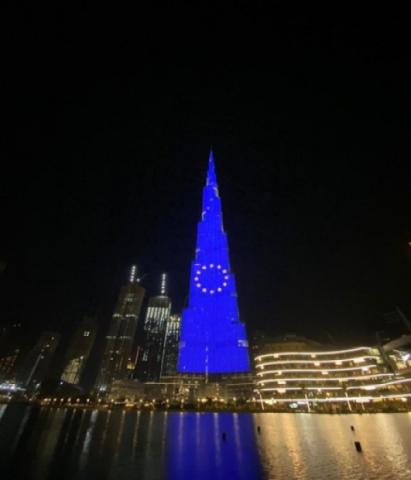RELATIONS WITH THE EU
The European Union and the United Arab Emirates
An overview of political and economic relations between the European Union (EU) and the United Arab Emirates (UAE).
On This Page
Political Relations
The EU and the UAE have developed a diplomatic relationship centred on common political and regional interests. The EU opened a Delegation in Abu Dhabi in the second half of 2013 as a testimony to its commitment to strengthening bilateral cooperation. The UAE also hosts the embassies of 26 EU countries. Relations with the EU previously existed under the 1988 EU-Gulf Cooperation Council (GCC) Cooperation Agreement, a region to region relationship with the countries of the GCC.
The EU and the UAE have a joint interest in ensuring stability in the Middle Eastern region. The UAE has been increasingly active on the regional and global scene, proving to be a solid and reliable partner for the EU in several fields, notably within trade, but also in areas such as counterterrorism, energy, environment, climate change, non-proliferation and economic diversification.
EU-UAE cooperation on energy and climate change has intensified in the last years with an increased focus on renewables and a post-oil sustainable future. Cooperation, including areas such as nationally determined contributions, hydrogen and climate financing, is foreseen to be further consolidated if the UAE will host COP28.EU-UAE cooperation on counterterrorism has progressed considerably in recent years also in the context of the Cooperation Arrangement. The UAE also hosts the Hedayah Countering Violent Extremism Centre in Abu Dhabi. The EU is a board member.
In addition, the UAE has been hosting a regional secretariat of the European Union Chemical, Biological, Radiological and Nuclear threats (CBRN) Centres of Excellence for risk mitigation since June 2014. This initiative is funded by the European Instrument for Stability and aims at developing, nationally and regionally, the institutional capacity needed to fight CBRN risks.
On maritime security, the EU has spearheaded international efforts in the Indian Ocean to contain and deter piracy and has shared interest in the Horn of Africa and in the safety of shipping lines which has led to closer EU-UAE cooperation.
Trade and Economic Relations
The UAE is an increasingly important economic partner for the EU. The country is the EU’s first export destination and investment partner in the MENA region. The UAE also serves as an important regional trade and logistics hub for EU operators. The EU remains the UAE’s second most important trading partner.
Bilateral trade and investment
The volume of bilateral trade in 2022 reached EUR 49 billion, which represents a 27% increase on annual basis, making the EU the second-largest trade partner of the UAE after China. Combined bilateral FDI stocks increased to 277 EUR billion in 2021 (latest available figure), which makes the EU the largest investor in the UAE by a significant margin.
The successful efforts by the UAE to diversify its economy from oil and to develop other productive sectors offers new opportunities for EU-UAE bilateral trade and investment cooperation in areas such as digitalisation, advanced technologies, renewable energy and energy efficiency, healthcare, education, sustainable economic transition, space technologies and food security.
EU-GCC Dialogue on Economic Diversification Project
In 2018, the EU launched the “EU-GCC Dialogue on Economic Diversification Project” to exchange best practices supporting the process of economic diversification in the Gulf, including the UAE.

